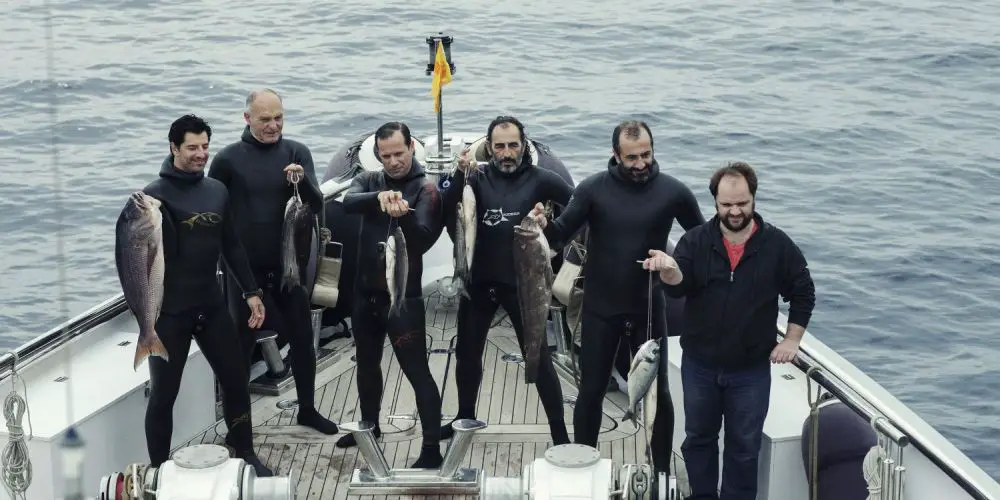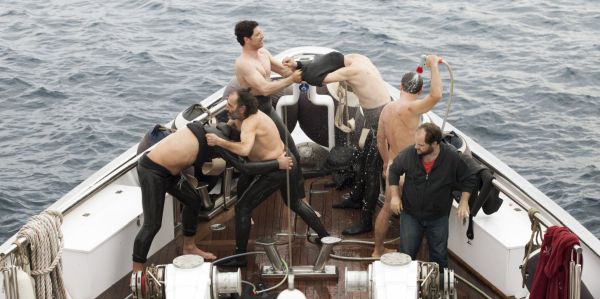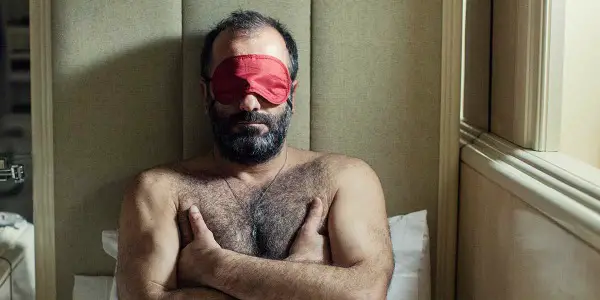CHEVALIER: An Absurdist Take On Modern Masculinity

Becky spends her days working in TV and she spends…
Chevalier is the uncomplicated story of six men on a diving expedition in the Aegean sea, and how their competitiveness is almost the undoing of all of them. Named as Best Film at the London Film Festival in 2015, it is an extraordinary film and one that is unmissable for anyone who enjoys a deeply disturbing comedy.
Despite having no female characters, Athina Rachel Tsangari’s Greek comedy speaks from an authoritative feminist voice, forcing hyper-masculinity under the microscope with hysterical consequences.
‘Who is the Best in General?’
On a quiet evening aboard the luxury yacht, sitting by candlelight due to a short power outage, a game is proposed by one of the group. We have already seen evidence of this group’s particular competitive nature – but this game is different. This is a game of ‘who is the best in general’, a game where everyone is constantly rated on everything that they do. Constantly.
They begin by rating how well the others sleep (posture, snoring), how well they clean the boat, but quickly becomes more and more absurd when the men begin comparing cholesterol levels, their ability to build IKEA flatpack bookshelves and the size of their erections. Despite sounding like the premise of a sinister horror movie, Tsangari keeps Chevalier firmly in the realm of the black comedy, never once crossing the line into either unbelievable or into real fear.
Chevalier expertly wastes no time in setting up any kind of context or existing relationships between the men on the boat. It is only through very limited (but specific) dialogue that we learn that Dimitris is the younger brother of Yannis, and is on the trip as a tag-a-long.
It is obvious from the start that The Doctor (otherwise unnamed) has organised this trip and is responsible for them all being there, but what is initially unclear is any of the relationships that the others have with him. It is left to the audience to uncover these connections, as the film leaves most connections unexplained, with dialogue hinting subtly at various relations between the men.

In a time where the vast majority of films are incredibly expositional, ensuring that the audience has every fact in place before the story begins, Chevalier is a refreshing experience in that the story begins with little to no exposition at all. It is slow and calculated – we are invited to watch and observe the daily routines of each character through long takes and extreme wides. There is no rush to get to any climax, even when the game begins.
In fact, it’s easily argued that there is no climax in Chevalier. The climactic moment is undercut by the men leaving the boat for good and departing to their respective homes, as the trip has come to an end. Nothing has changed. There is a sense of futility to the whole saga, as indeed the film itself. Isn’t this the point though? As desperate as each of them was to prove themselves the best, they each forgot that in the real world – it means absolutely nothing. It is, ironically, just a game.
Destructive Masculinity
Tsangari cleverly plays with the idea of masculinity and gender to create this bizarre, but fully believable sequence of events. Chevalier could easily make use of the tagline ‘the funniest big dick contest this year’ – and not only because there is actually a biggest dick contest in the film.
There are subtle hints about the destructive nature of hyper-masculinity, and later there are hints that are less subtle. One of the characters, Christos, is feminised from the beginning of the film. In one of his first scenes, he is showing parts of his body to his girlfriend over a webcam – an act that is usually reserved for women, especially on film. The girlfriend directs him to turn this way, demands what she wants to see and Christos obliges.

Later on, as Christos’ confidence is shaken by the contest, Christo repeats to himself in the mirror ‘I am the best, I am the best, my thighs are not fat, I am the best’. This level of body monitoring and insecurity is usually associated only with women, but the contest has emasculated each and every character, possibly Christos more than the others.
The addition of the ship’s crew, whose voices we hear regularly making announcements to the passengers, brings another dynamic to the film. Pitched as a the audience’s stand-in, the captain and the other crew members are puzzled and slightly amused by the game. So much so that they begin to take bets on which of the men will win.
As we are bemused and puzzled by the aggression of this game, so are the crew. Our ideas about how ridiculous the entire situation are justified by their reactions to it. The upstairs-downstairs trope gives more gravity to the class divide; it throws into very harsh light the privilege of the men who literally live and exist ‘above’ throughout the film. The crew’s conversations about the game help to maintain the comedy, despite delving into some pretty serious criticism of male class privilege.
Unhurried and Perceptive
On a technical note, Chevalier is a real treat for the senses. As mentioned earlier, Tsangari never rushes through any scenes, and often the camera lingers longer than we expect it to.
Utilizing long shots, primarily from one camera angle, heightens the comedy in many scenes. Instead of cutting away to close ups, we are allowed to view the sequence in its entirety, highlighting just how ridiculous it is, a trend that is introduced right at the beginning of the film when Dimitris is in the bath surrounded by his pebbles, whilst Yannis uses the toilet. The Greek islands themselves, and indeed the ocean, lend themselves to this slow style of cinematography; everything is beautiful, clean and pristine.

Tsangari’s handling of both cinematography, design and sound is impeccable – throughout its entirety the film feels polished and tight. It may be too much of a slow burner for some viewers, with no real climax or resolution, but this is clearly a deliberate choice. With no outcome or change, the game (and hyper-masculinity) is revealed for what it really is – utterly meaningless.
Conclusion
Perhaps it shouldn’t be important, but watching Chevalier and knowing it was directed by a woman possibly enforced this critique of masculinity even more. Chevalier was never going to be a film triumphing aggressive hyper masculinity ( Wolf of Wall Street, Goodfellas etc), but Tsangari’s outsider perspective shone a light on the intrinsic issues with masculinity in our society. In an absolutely hilarious way, of course.
What did you think of Chevalier’s message about masculinity in our modern Western world? Let us know in the comments!
Chevalier is currently screening at limited venues across the USA and the UK. Screenings listed here.
Does content like this matter to you?
Become a Member and support film journalism. Unlock access to all of Film Inquiry`s great articles. Join a community of like-minded readers who are passionate about cinema - get access to our private members Network, give back to independent filmmakers, and more.
Becky spends her days working in TV and she spends every other minute writing about cinema, TV & feminism. Based in London, she also likes drinking gin, re-watching 'The X Files' and writing about on-screen representation and all manner of things over at femphile.com













